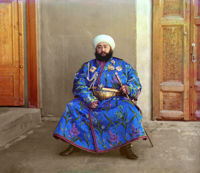Mahmud Ğulam Xan

| |
| Title: | Emir of Buxara; Enver of the Qurultaı |
| Term in office: | Qaban Jılı 1911–Tüyü Jılı 1944 |
| Predecessor: | Abdılahat Xan |
| Successor: | ? |
| Birth: | |
| Date: | 3- Qaņjar, Qoyan Jılı 1879 (3rd January 1880) |
| Place: | Buxara |
| Death: | |
| Date: | 28- Çavır, Tüyü Jılı 1944 (28th April 1944) |
| Place: | Buxara |
| Profession: | Ruling Emir |
| Relgious Affiliation: | Islam |
Biography
Mahmud Ğulam Xan (3rd January 1880 (1879 in Turkestani reckoning)-28th April 1944) was Emir of Buxara from 1911 to his death in 1944. From 1911-1922, he ruled the Buxarian city-state as an absolute ruler, even though Buxara was a Russian protectorate since 1873. He was a member of the Aq Süyük, the traditional nobility of Central Asia, and was an influential member of the Basmaçı Council during the Turkestani war of independence.
At the age of 13, he was sent to study in St. Petersburg by his father the previous Emir, and three years later returned home to take up a position in the government. He governed the province of Karmana until his father's death in 1910, when he took up the rule of the Emirate.
In the early years of his reign, he began to root out much of the corruption of the Buxarian government, announcing that he would no longer expect or accept "gifts" from supplicants, and prohibiting his officials from imposing taxes on their own authority. He went some way toward modernising the process of Buxarian government, and initially favoured reformists over traditionalists.
In 1916, the Basmaçı Revolt broke out, and Mahmud Ğulam Xan became one of the earliest leaders, seeing it as a way to both increase his personal power and advance the inderests of his people. The White Army and the Red both sent delegations to the Emir in 1918, and Ğulam Xan played them off against one another for a while, then arranged for them to ambush each other and virtually wipe each other out.
In the summer of 1917, he and Metropolitan Mar Addaıjan II of Samarqand met at Andıjan to negotiate a shared command of the Muslim and Assyrian Basmaçı in the Buxara area, but the meeting was only partially successful. He and the Assyrian Metropolitan could not agree on a workable unified command structure, but did agree not to fight each other, and to keep each other informed of their respective situations.
Ibrahim Enver was able to bridge the remaining gap between them, but some suspicion was probably inevitable between the two representatives of different religious communities.
After the death of Ibrahim Enver, Mahmud Ğulam Xan became the first host/leader, or Enver of the Qurultaı, and was Enver four more times, twice more than any other Enver.
During his later life, the Qurultaı government began to become a little more centralised, but Mahmud Ğulam Xan remained a major force in the assembly until his death.
After his death and the Russian "liberation" of Turkestan in 1948, the Emirship of Buxara became more and more a nominal dignity.